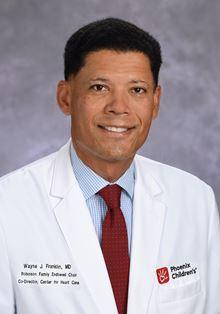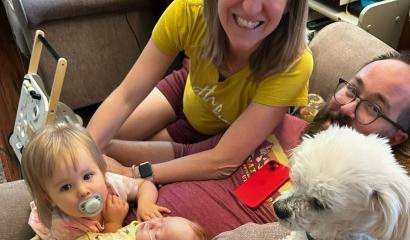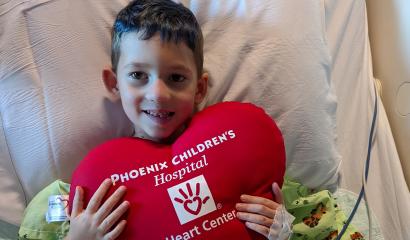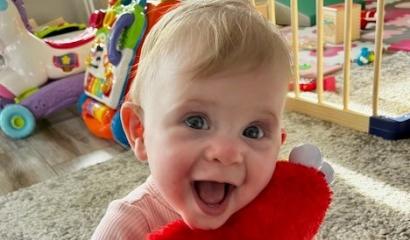Bright Futures
Articles and Updates from Phoenix Children's
Congenital heart defects (CHD) are the most common birth defects. While adults can develop heart problems over time due to lifestyle choices and other health issues, most congenital heart conditions cannot be prevented. About eight out of 1,000 babies are born with CHD every year. However, thanks to medical innovations over the past 40 years, 90 percent of children born today with a heart defect will live to adulthood.
Many of these innovative treatments are taking place right here at Phoenix Children’s. Wayne J. Franklin, MD, FACC, co-director of the Center for Heart Care and division chief of Cardiology, is proud of the medical community's progress in treating CHD.
"The first heart surgery on a child was performed in 1944. Back then, children with complex heart defects often died before becoming adults. Now, most defects are treatable, or we can at least temporize them for years. That's incredible progress," Dr. Franklin said.
The five most common congenital heart defects
Of the 20 or so heart defects that Phoenix Children's Center for Heart Care treats, Dr. Franklin shared the five that are most common:
1. Aortic valvar stenosis (AVS)
The aortic valve is one of four heart valves that keeps blood flowing through the heart in one direction. A healthy aortic valve has three flaps of tissue (cusps) that act as a one-way door. With AVS, the valve either has only two cusps instead of three or the three cusps don't work correctly, making it harder for the blood to flow. If a child’s symptoms are mild, doctors may just monitor the symptoms closely with periodic office visits. If the defect is more severe, doctors may need to repair or replace the aortic valve or the cusps with surgery.
2. Atrial septal defect (ASD)
The atrial septum is the wall between the heart's two upper chambers, called the atria. An ASD is an abnormal hole in this wall. This defect can cause too much blood to reach the lungs and make the heart work harder. Some ASDs close on their own as a child grows. In such cases, a child may need to take medicine to help their heart work more efficiently. If an ASD hasn't closed by the time a child starts school, a cardiologist may decide to close it with surgery or by inserting a device called a septal occluder to stop blood from seeping through the hole.
3. Ventricular septal defect (VSD)
A VSD is a hole in the wall separating the two lower chambers of the heart – the right and left ventricles. In a healthy heart, the wall prevents blood from mixing between the two ventricles. A VSD allows blood to flow the wrong way and can cause abnormal lung pressure. Some children with a VSD may need supplemental nutrition to help them gain weight and medicine to help their heart work better. VSDs can be closed via surgery or the insertion of a septal occluder, similar to an ASD surgery.
4. Cyanotic heart defect (CYHD)
Cyanotic heart defects (CYHD) are a group of defects that are either underdeveloped areas in the heart, making it too small to pump enough blood, or valves and arteries that are not entirely formed. When babies are born with CYHD, their skin has a bluish tint, so the condition is sometimes called "blue heart." Most kids with CYHD need oxygen therapy and medication to open up their arteries. Surgery may also be required to repair defects or redirect blood flow through the heart.
5. Mitral valve regurgitation (MVR)
This condition is sometimes referred to as "leaky valves." A heart has four valves that push blood through the heart's four chambers each time it beats. With MVR, the valves do not close tightly enough, and blood is pushed backward instead of forward. If the defect does not cause severe symptoms, doctors may prescribe medicine to help the heart work more efficiently. In more severe cases, surgery may be required to repair or replace the valve.
Researchers do not know what causes most congenital heart defects. However, we do know that some are caused by genetics or other birth defects.
Four facts to know about congenital heart defects (CHD)
1. The most common sign of CHD is a heart murmur
A heart murmur is an abnormal sound the heart makes as it pumps blood. A heart murmur is detected by an echocardiogram or an ultrasound. Doctors can hear heart murmurs both before and after birth. However, not all CHD causes heart murmurs.
Other signs and symptoms will appear differently in kids depending on their age. For example, infants may exhibit fast breathing or blue lips, and toddlers may not move as fast as other kids on the playground. School-age children may report that their heart feels "funny," like a butterfly in their chest. Teenagers may experience shortness of breath, or their coloring may change when exercising.
2. Chest pain is not common in CHD
When it comes to signs and symptoms of heart defects, Dr. Franklin emphasized this point, "It is a myth that chest pain, dizziness and fainting are signs of heart defects in children. Heart murmurs are a much more common sign. Parents should talk to their doctor if their child is experiencing these symptoms, but they are most likely not a sign of a heart condition."
3. Heart surgery is most often the best treatment
Heart procedures range from minimally invasive repairs, where doctors use catheters to redirect valves, to open heart operations to treat complex cardiac conditions, or even heart transplants. In addition, pacemakers, mechanical pumps or defibrillators can be placed in children of any age to monitor and stimulate their heartbeat. Medications also are used to stabilize kids with CHD but are rarely the only treatment they need.
"The goal of any treatment is to give a child the opportunity to live a full and active life. So many of our patients go to school, play sports and do all the things other kids do, with the right care," Dr. Franklin explained.
4. A new cardiology subspecialty has emerged
Advances in treatment mean that there is now a greater number of adults with congenital heart defects than ever before. As children with CHDs transition to adulthood, it is important that they maintain their cardiac health. However, finding facilities that specialize in adult CHD is not easy. Dr. Franklin’s team is the only adult CHD treatment provider in Arizona accredited by the Adult Congenital Heart Association.
“We take care of patients from twinkle to wrinkle,” Dr. Franklin said with a smile.
Phoenix Children's Center for Heart Care provides comprehensive heart care
No matter a patient's age, the cardiology team at Phoenix Children’s is equipped to diagnose and treat the full range of heart conditions, from fetal diagnosis to newborn, childhood and adulthood heart care. The heart team includes cardiologists and cardiac surgeons, nurse practitioners, physician assistants and other providers. The team also partners with specialists in other departments when a patient has other health or genetic issues.
The doctors at Phoenix Children's Center for Heart Care treat patients from across the country and around the world. However, Dr. Franklin emphasized, “We never forget where we are. We are here for our community. I want to make sure that every family in the Valley knows they can get world-class medical care for their children right in their backyard.”
Learn more about Phoenix Center’s Center for Heart Care.



